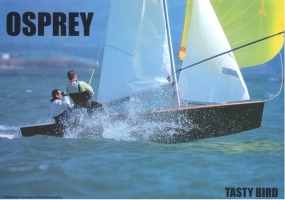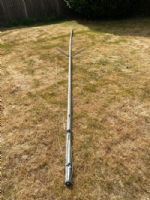| Author |
 Share Topic Share Topic  Topic Search Topic Search  Topic Options Topic Options
|
r2d2 
Far too distracted from work

Joined: 29 Sep 11
Online Status: Offline
Posts: 350
|
 Post Options Post Options
 Quote Quote  Reply Reply
 Topic: Standard of Proof? Topic: Standard of Proof?
Posted: 12 Jun 12 at 7:02am |
|
Hi Brass
Just reading this thread as an impartial outsider, there was initially some very helpful replies to the question asked, but I have to say that later on there seemed to be a bit of almost paranoid speculation creeping in. Couldn't a more straightforward interpretation be that rather than C and B ganging up on A, A simply didn't do his/her turns and tried to get away with it? If the protest is ruled as not valid, doesn't that give out the message that if you are not seen (100%) of the time you can pretty much get away with anything?
Edited by r2d2 - 12 Jun 12 at 10:26am
|
 |
Pierre 
Really should get out more


Joined: 15 Mar 04
Location: United Kingdom
Online Status: Offline
Posts: 1532
|
 Post Options Post Options
 Quote Quote  Reply Reply
 Posted: 12 Jun 12 at 9:37am Posted: 12 Jun 12 at 9:37am |
Originally posted by r2d2
If the protest is ruled as notvalid, doesn't that give out the message that if you are not seen (100%) of the time you can pretty much get away with antlything? |
+1
|
 |
ohFFsake 
Far too distracted from work

Joined: 04 Sep 08
Location: United Kingdom
Online Status: Offline
Posts: 219
|
 Post Options Post Options
 Quote Quote  Reply Reply
 Posted: 12 Jun 12 at 10:05am Posted: 12 Jun 12 at 10:05am |
Hi, I have to say I was getting the exact same feeling! To answer the points raised in Brass's last post... 1. Surely the PC should consider the content of the protest and it's validity as two entirely separate issues. If it is decided that it is valid then it should be dealt with strictly by the rules. An attitude of being "happy to dismiss it" would seem to indicate that the PC have allowed themselves to be biased by their earlier considerations.
2. Where does the "put the matter to a strict proof" come from? Didn't we establish earlier that the standard of proof to rule 2 is "balance of probability". As above, surely it can't be right to decide that a stricter test of proof needs to be met because the protest is in some way "dodgy", for want of a better word!
3. Regarding the onus on B to protest immediately, what are they supposed to do when they are fouled and the offending boat appears to accept the penalty and take a 720? Are they expected to stop and wait to check that they have actually done so?
4. The original foul was rule 10. My understanding is that A tacked onto port in front of B and then failed to keep clear. This was accepted as fact by all parties so the only issue for debate was whether or not they exonerated themselves correctly. In the protest meeting A was questioned and asserted that she had completed her turns, and when questioned further also stated that she had not commenced them until after the starting signal. Both these facts were disputed by B, on the evidence of C's testimony. From what I've read in the earlier posts, my interpretation is that the PC needs to decide:
1. Whether B protested at the earliest possible opportunity
2. whether it was more probable that A did or did not complete two full penalty turns
3. If the answer to B is "yes" then whether it is more probable that she commenced them before or after the starting signal. Whether a failure to do so is a transgression of rule 10 or rule 2 (or both) isn't really the point at issue here, the question was what standard of proof needs to be met in the "finding of facts". And as an aside, R2D2 has hit the nail right on the head in terms of the overall point at issue here. There is a strong feeling within the club that deliberate cheating of this nature is getting out of hand, to the extent that consideration is actively being given to policing these races with on-water juries. My own view is that this is the wrong approach, and I'd hoped that this protest would send a clear message out that the fleet should self-police in the interests of fair sailing and good sportsmanship. Unfortunately it seems that the exact opposite has been achieved - ie it has demonstrated that the standards of proof required for a protest to succeed are so high that there is effectively no policing at all.
|
 |
Rupert 
Really should get out more

Joined: 11 Aug 04
Location: Whitefriars sc
Online Status: Offline
Posts: 8956
|
 Post Options Post Options
 Quote Quote  Reply Reply
 Posted: 12 Jun 12 at 10:20am Posted: 12 Jun 12 at 10:20am |
|
This sounds like an "education" issue. People need to be reminded that sailing is a self policing sport, and that the rules are there to make things level, not to be wormed around.
Maybe the club should set up a rules evening, not just looking at the rules in action, but looking at the concept of sportsmanship and fair play, too.
Who here (and I'll put my hand up) has won a race having broken a rule and not done anything about it? Hitting a mark when no one is looking is an obvious one. Did it cheapen the win at the time? Does it cheapen it looking back? Win at all costs doesn't (as far as I'm concerned) make any sense in a sport we are only doing because it is fun. I can see how this would change if your livelihood was on the line, but this doesn't apply to most on here.
|
|
Firefly 2324, Puffin 229, Minisail 3446 Mirror 70686
|
 |
RS400atC 
Really should get out more

Joined: 04 Dec 08
Online Status: Offline
Posts: 3011
|
 Post Options Post Options
 Quote Quote  Reply Reply
 Posted: 12 Jun 12 at 11:54am Posted: 12 Jun 12 at 11:54am |
Originally posted by ohFFsake
......, R2D2 has hit the nail right on the head in terms of the overall point at issue here. There is a strong feeling within the club that deliberate cheating of this nature is getting out of hand,...... |
I think you are making a mistake trying to fix the problems in your club by focusing on one incident in one race. You need to look forwards and educate people that in situations like this, they must hail 'protest'. No need for that to be unfriendly in any way, I recently made a mistake coming into a crowded mark, a young bloke in the club hailed in a perfectly friendly way 'protest RS400, will you do turns?' to which I replied that I would, and did so as soon as I could get enough space. Trying to make a right of way mis-judgement into a rule 2 issue is not something you should do lightly, particularly if the culture in your club has slipped towards general laissez-faire about the rules, rather than that one individual being the sole root of the problem. Look forwards and try to make sure future incidents are dealt with properly.
|
 |
ohFFsake 
Far too distracted from work

Joined: 04 Sep 08
Location: United Kingdom
Online Status: Offline
Posts: 219
|
 Post Options Post Options
 Quote Quote  Reply Reply
 Posted: 12 Jun 12 at 12:28pm Posted: 12 Jun 12 at 12:28pm |
In general I agree with the points made in the last two posts. Unfortunately the issue we have is one or two sailors who continually, knowingly and deliberately ignore the rules in the (correct!) belief that nothing will get done about it. It will probably come as no surprise when I say that this is in our junior fleet! Most sailors seem to want to sail fairly apart from the odd aberration, but a tiny minority employ a "win at all costs" approach, deliberately causing collisions to distract their opponents, ignoring basic ROW rules, barging in at starts / marks and so on. So this wasn't a case of elevating a mis-judgement into a rule 2 - in truth the fair sailing was really the starting point. As noted earlier, having a jury boat following specific sailors round has been suggested, but this seems to be completely counter-productive, as it simply reinforces the belief that you only need to follow the rules when you know you are being observed. What I'd hoped was that a protest would demonstrate the principle that self-policing can work. But if evidence needs to be proven to "criminal standard" this clearly isn't going to work, as it is virtually impossible to achieve that level of proof. So my reason for this post was to see just how far the PC need to go, and thankfully it seems from the replies earlier that a much lower standard of proof is sufficient. This is as much about learning how to conduct protests effectively and fairly - something we haven't had to do for some years in our small and generally friendly club!
|
 |
Brass 
Really should get out more

Joined: 24 Mar 08
Location: Australia
Online Status: Offline
Posts: 1151
|
 Post Options Post Options
 Quote Quote  Reply Reply
 Posted: 12 Jun 12 at 12:36pm Posted: 12 Jun 12 at 12:36pm |
I don't want to seem to be 'de-railing' the thread from what you wanted to talk about which obviously is 'standard of proof', but the way 'standard of proof works can be a bit influenced by what facts or assertions one is trying to prove.
I have interlined some more responses to your post which I hope are helpful, or at least explanatory.
Originally posted by ohFFsake
Hi,
I have to say I was getting the exact same feeling!
To answer the points raised in Brass's last post...
1. Surely the PC should consider the content of the protest and it's validity as two entirely separate issues. If it is decided that it is valid then it should be dealt with strictly by the rules. An attitude of being "happy to dismiss it" would seem to indicate that the PC have allowed themselves to be biased by their earlier considerations.
You're quite right. But sometimes protest committees, being human and fallible, have misgivings about where their hearing is heading.
2. Where does the "put the matter to a strict proof" come from? Didn't we establish earlier that the standard of proof to rule 2 is "balance of probability".
'Strict proof' in this context doesn't mean proof to a standard any stricter than the required standard: 'balance of probabilities'. 'Put the matter to strict proof' means that A says nothing and leaves it up to B to prove, by bringing relevant evidence, and appropriate argument, every bit of whatever it is that B is asserting about whether or not A took penalty turns in accordance with rule 44.2.
As above, surely it can't be right to decide that a stricter test of proof needs to be met because the protest is in some way "dodgy", for want of a better word!
You're quite right. But sometimes protest committees, being human and fallible ...
3. Regarding the onus on B to protest immediately, what are they supposed to do when they are fouled and the offending boat appears to accept the penalty and take a 720? Are they expected to stop and wait to check that they have actually done so?
If B thinks A has broken a rule and B wants A to be penalised for breaking that rule B needs to:
- hail 'Protest' and conspucuously display a red flag (if B is over 6m) at the first reasonable opportunity for each after the incident in accordance with rule 61.1(a);
- If B is not satisfied that A has taken a penalty in accordance with rule 44, then B needs to deliver a written protest, containing the required information within the required time in accordance with rules 61.2 and 61.3, then
- attend the scheduled protest hearing, presenting all necessary evidence and making sound persuasive arguments.
No, B is not expected to stop and wait to check whether A has done her turns in accordance with rule 44.2. B needed to have hailed 'Protest' and displayed her flag at the first reasonable opportunity after the incident: that would normally be before A started to do penalty turns.
Yes: if you want to have a protest hearing about an incident on the water, you must hail 'Protest and display the flag at the first reasonable opportunity and RYA Appeals 1981/7 and 1999/1 give guidance about how 'first resonable opportunity' should be interpreted. |
OK, here we're coming down to brass tacks (my favourite kind <g>).
Originally posted by ohFFsake
4. The original foul was rule 10. My understanding is that A tacked onto port in front of B and then failed to keep clear. This was accepted as fact by all parties so the only issue for debate was whether or not they exonerated themselves correctly. OK, quite clear. In the protest meeting A was questioned and asserted that she had completed her turns,
OK, so we have A's testimony that she did turns, and A was on her boat 100% of the time.
We have C's testimony that she watched 90% of the time and did not see A do any turns.
We have the protest committee's inference, amounting to a finding of fact, that in the 10% of time that C was not watching, there was enough time for A to have done her turns, so C's evidence does not even contradict A's evidence: C's evidence about the disputed 10% of the time is about what she did not see, not what she did see.
Well, here's the rub, isn't it? Protest committee drew one infrence from the available evidence, you would perhaps, have drawn another.
In passing, I wouldn't mind betting that B was taken by surprise by C's 90% evidence: B probably thought C was going to give evidence that she saw the whole thing (100%), and didn't have any evidence or argument prepared to account for the missing 10%.
We all need to understand that fact-finding in a protest hearing is a co-operative endeavour between the parties and the protest committee. Parties have to bring evidence and lay out arguments to convince the protest committee of whatever it is that they want the protest committee to find as facts. They can't just leave it to the magnificent forensic and judicial skills of the protest committee.
B, as the protesting boat needed to persuade the protesst committee that it was more likely than not that A did not do her turns in the 10% of time when C wasn't looking. To deal with the 'missing 10%', B probably should have brought evidence and advanced argument about:
- How long the time was that C was watching A ('the 100% of the time')? For example 2 minutes
- The calculation of how long 10% of that time was: For example 12 seconds
- Was the 10% of time that C wasn't looking one block of continuous time or was the 10% split up into two or more periods of less than 10%?
- How long it takes a boat like A to perform 1 turn, (1 tack and 1 gybe)
- How long it takes a boat like A to perform 2 turns (double the above)
- What were the chances that A could have fitted her 2 turns in the time as calculated into the 10% time as calculated: in the example quoted, coudl A do one turn in 6 seconds, for 2 turns in 12?
Based on the above 'mathematactics' I would tend to agree with you, that it was pretty unlikely that A could have got her turns in. All the moreso if the 10% wasn't a continuous period.
But if B was caught 'on the hop' by C's unexpected testimony about only 90%, then I wouldn't be surprised if she didn't lay the argument out like that. Likewise, a protest committee with one or two judges cleverer than I am, might have asked those relevant questions, but you can't really blame them if they didn't analyse it in that detail without some prompting from the parties.
I think you have to 'chalk this one up to experience'. If B had presented her protest better OR if the protest committee had anslysed a bit better, the decision might have gone the other way.
Also, in passing, if the mathematactics had stacked up as I would have expected them to: more than 6 seconds to do a turn, less than 12 seconds to do two in, or similar, then, I would expect that to be sufficient to raise 'reasonable doubt', even if the standard of proof had been beyond reasonable doubt.
and when questioned further also stated that she had not commenced them until after the starting signal. Both these facts were disputed by B, on the evidence of C's testimony.
I don't see that that is a particular problem. A boat is not limited to taking penalty turns until after the starting signal. The only issue would be whether, given the incident took place 20 seconds before the starting signal, did A 'get well clear of other boats ... as soon ... as possible'. Given that A was seen to bear away as if to take her turns, that 20 second time-frame seems OK to me.
From what I've read in the earlier posts, my interpretation is that the PC needs to decide:
1. Whether B protested at the earliest possible opportunity
Well, technically the 'protest' is the written document alleging that A broke the rules, which must be given to the race office within the Protest Time Limit (rule 61.3).
What B needs to do at the first reasonable opportunity is hail 'Protest' and if she is over 6m, conspicuously display a red flag (rule 61.1(a)).
2. whether it was more probable that A did or did not complete two full penalty turns
Yup, and A brought evidence (her own testimony) that she did, and B brought evidence that for 90% of the time, she didn't, and the protest committee balanced that up and found that she did.
3. If the answer to B is "yes" then whether it is more probable that she commenced them before or after the starting signal.
Irrelevant. A boat may take a rule 44 penalty for a breach while racing (that is from her prep signal until she has finished and cleared the finidhing line and marks (rule 44.1). Rule 44.2 limits where a boat may take a penalty at or near the finishing line, but there is no other limit on where or when, except 'as soon after the incident as possible in rule 44.2.
|
And here we have some rather more contentious stuff.
Originally posted by ohFFsake
Whether a failure to do so is a transgression of rule 10 or rule 2 (or both) isn't really the point at issue here, the question was what standard of proof needs to be met in the "finding of facts".
You still haven't quite got around to telling us what the exact incident was that was alleged not to be in compliance with recognised principles of sportsmanship and fair play, but let it pass.
And as an aside, R2D2 has hit the nail right on the head in terms of the overall point at issue here. There is a strong feeling within the club that deliberate cheating of this nature
Whoah there pardner. One of your fellow club members has just been subject to a rule 2 protest alleging that she has not competed in compliance with recognised principles of sportsmanship and fair play, and that protest has been dismissed. That means that a protest committee, consisting of your fellow club members has found that your fellow competitor has competed in compliance with recognised principles of sportsmanship and fair play.
You just can't go throwing the C word around.
is getting out of hand, to the extent that consideration is actively being given to policing these races with on-water juries.
IMHO, on-water judging just says that nobody in the fleet trusts anybody else to sail by the rules. If it comes to that, I'd be looking for another club.
On-water judging, if you want it done properly and not just an embarrassing 'amateur hour' is a very high budget way to go.
My own view is that this is the wrong approach, and I'd hoped that this protest would send a clear message out that the fleet should self-police in the interests of fair sailing and good sportsmanship.
I think you are asking too much of the protest process if you want it to 'send messages'. It's function is to resolve disputes.
Unfortunately it seems that the exact opposite has been achieved - ie it has demonstrated that the standards of proof required for a protest to succeed are so high that there is effectively no policing at all.
I suggest that this was just one of those 'hard cases that make bad law'.
The problem was, I think, that B didn't present her case as well as she could and just didn't manage to persuade the protest committee. |
Can I yet again recommend the following articles about rules compliance from Dick rose
Edited by Brass - 21 Sep 17 at 12:52pm
|
 |
ohFFsake 
Far too distracted from work

Joined: 04 Sep 08
Location: United Kingdom
Online Status: Offline
Posts: 219
|
 Post Options Post Options
 Quote Quote  Reply Reply
 Posted: 12 Jun 12 at 1:18pm Posted: 12 Jun 12 at 1:18pm |
Thanks for the lengthy and detailed reply. I accept much of what you say, but will try and keep my reply brief and "on-topic". What I'm really trying to establish here is a way that we can all learn from this, going forwards. And that means the PC team as much as anyone. I agree entirely with what you say about on-water juries up to and including the comment about changing clubs. However (and I'll say it again) there is a clear issue in the club with "cheating of this nature" (that is to say deliberate fouling of the manner discussed in this thread, regardless of whether proven or not in this instance) and we need to look for ways to nip this in the bud. While we're on the subject, the alleged transgression of Rule 2 was the action of A in deceiving B into thinking she was going to take a penalty and then choosing not to do so as soon as B's back was turned. I see that as a fairly clear definition of not being in compliance with recognised principles of sportsmanship and fair play. Is that reasonable? Ultimately I agree with your closing point. The difficulty here was that a 13 year old in her first protest meeting was wrong-footed by the PC cross-examining C, previously certain of his evidence, and leading him into admitting that he could not possibly have watched another boat continuously for the entire first beat. I think this may have been a well intentioned effort by the PC to defuse the situation by effectively "dissolving" the protest. This is perhaps something else that we need to discuss. Just to round this off, the other bit of evidence I deliberately haven't mentioned is that a safety boat crew witnessed that entire incident from 20 yards downwind, and exactly corroborated B and C's version of events. However they chose to exclude themselves from the hearing on the grounds that as B's mother and sister they were interesed parties...
|
 |
RS400atC 
Really should get out more

Joined: 04 Dec 08
Online Status: Offline
Posts: 3011
|
 Post Options Post Options
 Quote Quote  Reply Reply
 Posted: 12 Jun 12 at 1:41pm Posted: 12 Jun 12 at 1:41pm |
Originally posted by ohFFsake
...the alleged transgression of Rule 2 was the action of A in deceiving B into thinking she was going to take a penalty and then choosing not to do so as soon as B's back was turned. I see that as a fairly clear definition of not being in compliance with recognised principles of sportsmanship and fair play. Is that reasonable?...... |
Well, that is one interpretation, but another is that she simply changed her mind and thought she was not in the wrong, so was prepared to defend her actions in a protest, but the other boats lacked the will, conviction or ability to protest her in accordance with the rules. Any of the witnesses could have protested but did not.
|
 |
Presuming Ed 
Really should get out more

Joined: 26 Feb 05
Location: United Kingdom
Online Status: Offline
Posts: 641
|
 Post Options Post Options
 Quote Quote  Reply Reply
 Posted: 12 Jun 12 at 1:49pm Posted: 12 Jun 12 at 1:49pm |
Originally posted by ohFFsake
While we're on the subject, the alleged transgression of Rule 2 was the action of A in deceiving B into thinking she was going to take a penalty and then choosing not to do so as soon as B's back was turned. I see that as a fairly clear definition of not being in compliance with recognised principles of sportsmanship and fair play. Is that reasonable? |
Absolutely.
|
 |



 Post Options
Post Options
 Quote
Quote  Reply
Reply
 Topic: Standard of Proof?
Topic: Standard of Proof?



 Post Options
Post Options
 Quote
Quote  Reply
Reply
 Posted: 12 Jun 12 at 9:37am
Posted: 12 Jun 12 at 9:37am


 Post Options
Post Options
 Quote
Quote  Reply
Reply
 Posted: 12 Jun 12 at 10:05am
Posted: 12 Jun 12 at 10:05am


 Post Options
Post Options
 Quote
Quote  Reply
Reply
 Posted: 12 Jun 12 at 10:20am
Posted: 12 Jun 12 at 10:20am


 Post Options
Post Options
 Quote
Quote  Reply
Reply
 Posted: 12 Jun 12 at 11:54am
Posted: 12 Jun 12 at 11:54am


 Post Options
Post Options
 Quote
Quote  Reply
Reply
 Posted: 12 Jun 12 at 12:28pm
Posted: 12 Jun 12 at 12:28pm


 Post Options
Post Options
 Quote
Quote  Reply
Reply
 Posted: 12 Jun 12 at 12:36pm
Posted: 12 Jun 12 at 12:36pm


 Post Options
Post Options
 Quote
Quote  Reply
Reply
 Posted: 12 Jun 12 at 1:18pm
Posted: 12 Jun 12 at 1:18pm


 Post Options
Post Options
 Quote
Quote  Reply
Reply
 Posted: 12 Jun 12 at 1:41pm
Posted: 12 Jun 12 at 1:41pm


 Post Options
Post Options
 Quote
Quote  Reply
Reply
 Posted: 12 Jun 12 at 1:49pm
Posted: 12 Jun 12 at 1:49pm



























 Printable Version
Printable Version Delicious
Delicious Digg
Digg Facebook
Facebook Furl
Furl Google
Google MySpace
MySpace Newsvine
Newsvine reddit
reddit StumbleUpon
StumbleUpon Twitter
Twitter Windows Live
Windows Live Yahoo Bookmarks
Yahoo Bookmarks Topic Options
Topic Options